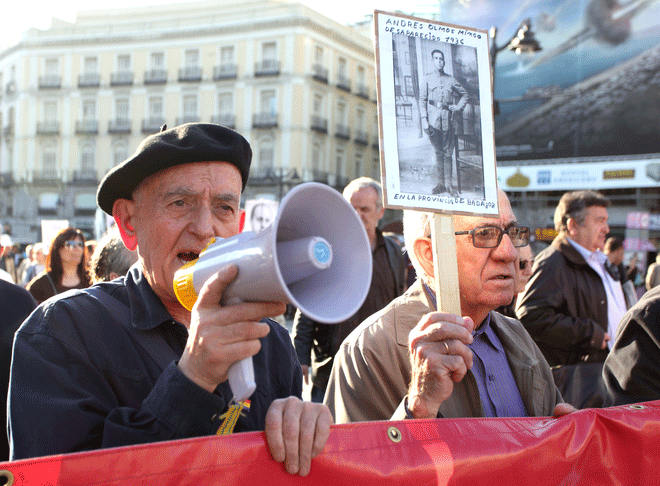An artist is being sued for depicting Spanish dictator Francisco Franco jammed in a fridge. Miren Gutierrez examines the restrictions on art exploring the Spanish Civil War

“Always Franco” sculpture (Demotix)
“Always Franco” raised a few eyebrows when it was exhibited in Madrid last February. The sculpture of the Spanish dictator jammed inside a Coca Cola fridge, in his characteristic green military uniform and dark sunglasses, was apparently too much for some nostalgic souls.
The artist, Eugenio Merino, is being taken to court by Francisco Franco National Foundation (FNFF) — an organisation dedicated to “disseminating the memory and work” of Franco.
Last February, FNFF vice-president Jaime Alonso visited ARCO — the modern art fair in Madrid where the work was being exhibited — escorted by a notary, to take pictures of the work. The sculpture was “grotesque”, he declared, and an attempt against “someone’s dignity”, someone who “couldn’t defend himself because he is dead”.
“This work generates hatred and confrontation” said Alsonso, quoted by El Mundo. “You can think what you want of Franco, but taunting people is simply not acceptable.”
“ARCO took place in February. In July, I received the lawsuit, and on February 21 2013, I will go to court,” says Merino in an email interview.
FNFF is suing him for damaging their honour, identity or image indirectly through harmful conduct. They want Merino to pay 18,000 euro in compensation.
It appears that Merino is not going to get a lot of institutional backing, “the director of the art fair (Carlos Urroz) has not even sent me an email to offer his help against this attack to the freedom of speech (sic),” says Merino.
Index tried to get Urroz’s version of events, but our email went unanswered.
Apparently in response to the FNFF’s complaints, José María Álvarez del Manzano, President of the IFEMA — which is the institution where the fair takes place — sent them a soothing letter.
In the letter sent while the exhibition was still in situ, he said that “personally… I find this an indignity, because representing any human being like that, independently of the personality of General Franco (sic), is absolutely inadmissible. Above all, I think the author only pretended, in principle, to draw people’s attention.” He went on to say that as much as he liked to remove the work from the fair, it would grant “unmerited” attention to Merino’s work.
After staging a coup against the Republican government, Franco was the authoritarian head of state of Spain from the end of the Civil War (1936-39) until he died peacefully of old age in 1975.
Memories, only for some
Even though Spain passed laws in 2007 to remember and repay the victims of the Civil War and the dictatorship that ensued — the Historical Memory Law — it looks like evoking Franco’s times is still not easy in Spain.
Trying to fill a legal vacuum left by the law, in 2008, “superjudge” Baltasar Garzon opened an inquiry into alleged crimes against humanity during the Spanish Civil War and after, and exhumed 19 victims’ remains.
However he found plenty of obstacles and enemies. A 1977 general amnesty had pardoned all criminal offenses with a political purpose previous to 1976 and these offenses were almost 70 years old, prior to the conception of “crimes against humanity”. In 2009, an organisation called “Manos limpias” (Clean Hands) filed a lawsuit against him, and a few months later, Garzon was indicted by the Spanish Supreme Court for prevarication, or breaching his legal duty.

Weekly meeting to remember Franco’s victims in the Puerta del Sol, Madrid [NathaliePaco – Demotix]
At the end, Garzon dropped the investigation, was barred from judicial activity (with pay) and stood trial. At the beginning of 2012, the Spanish Supreme Court found Garzon innocent on these charges.
Meanwhile, anthropologist Francisco Etxeberria and a team of forensic experts had continued digging up mass graves from the Civil War period. As Etxeberria said in an interview with this writer in 2010, most of the victims’ remains that have been unearthed so far were from the Republican side.
“We have also been asked to investigate right-wing people killed by the Republicans” he said. But there are few such cases left to investigate, since the Franco regime did so itself after the war ended. Furthermore, there is no comparison between the victims on the two sides, in either quantitative or qualitative terms.”
About the case against Garzon, Etxeberria commented: “It looks like we’re sliding backwards. In Spain there is no risk of a return to dictatorship, but this is a sad development that brings to mind pre-constitutional times. Actually, the victims’ families had sought judicial support and safeguards to provide legal guarantees for the investigation that was launched.”
According to Etxeberria, the Historical Memory Law was an attempt to “move from truth to reparations, but no one wants to get involved in the justice aspect.” No one, that is, except for Judge Garzon who launched the unprecedented and short-lived legal inquiry of 2008.
“The three rights of victims are truth, justice and reparations, and these have not been forthcoming” in the case of the roughly 200,000 victims of murder and forced disappearance during the war, he concluded. Historians have put together lists of up to 130,000 people killed in areas not near the front lines. These crimes involved forced disappearance, to which no statute of limitations applies.
“In the past two weeks, we have opened new graves and recovered more remains — says Etxeberria now in an email interview with INDEX. There is no institutional support whatsoever, but we will continue doing what we can with the resources of the (Basque Country) University and the investigative teams we have. Currently, we have already discovered 300 mass graves and recovered more than 5,000 bodies. There are (private) commemoration ceremonies every week… This means that we go on and that there is still public interest.”
Etxeberria mentions the book Jueces, pero parciales. La pervivencia del franquismo en el poder judicial (Judges, but partial. The endurance of Franquismo in the judiciary), by Carlos Jimenez Villarejo (prosecutor) y Antonio Doñate (judge). “(The authors) demonstrate why the courts don’t have an interest in investigating these crimes. Judges have been involved in only 10 of all the exhumations so far,” he says.
Franquismo is a term used to refer to Franco’s regime and his government style, which combined right-wing thinking, traditional Catholicism and economic self-reliance.
The glorification of Franco continues today
Organised by FNFF, “120 years after, Francisco Franco, present!” is the slogan a tribute to the dictator to be celebrated on 2 December in Madrid. Critics have pointed out that the event is to take place in public facilities and that FNFF receives public funding too, as does the dictator’s monumental burial vault.
It is ironic that while excavations of mass burials of Civil War victims proceed with virtually no financial support and rely on the work of dozens of volunteers from around the world, the victims of franquismo continue paying with their taxes for the maintenance of Franco’s grandiose mausoleum in the “Valley of the Fallen”, conceived by Franco himself to honour those who fell during the Civil War. About 10 per cent of the construction workforce were convicts, some of them political prisoners.
The Association for the Recovery of Historical Memory has recently demanded the Spanish government to put a stop to it and invite Franco’s family to take charge of his remains, as it the case in Italy with Benito Mussolini’s.
“There is a contradiction in the political class, because they say these are times of remembrance and they talk about ‘the duty of memory’ for everything except for the ‘francoist’ crimes”, says Etxeberria. “For the right, saying this divides citizens’ suffices.”
It looks like in today’s Spain there is still little room for either free artistic exploration of the Civil War and the dictatorship that followed or full remembrance and reparation for its victims.
Miren Gutierrez is Editorial Director of Index




